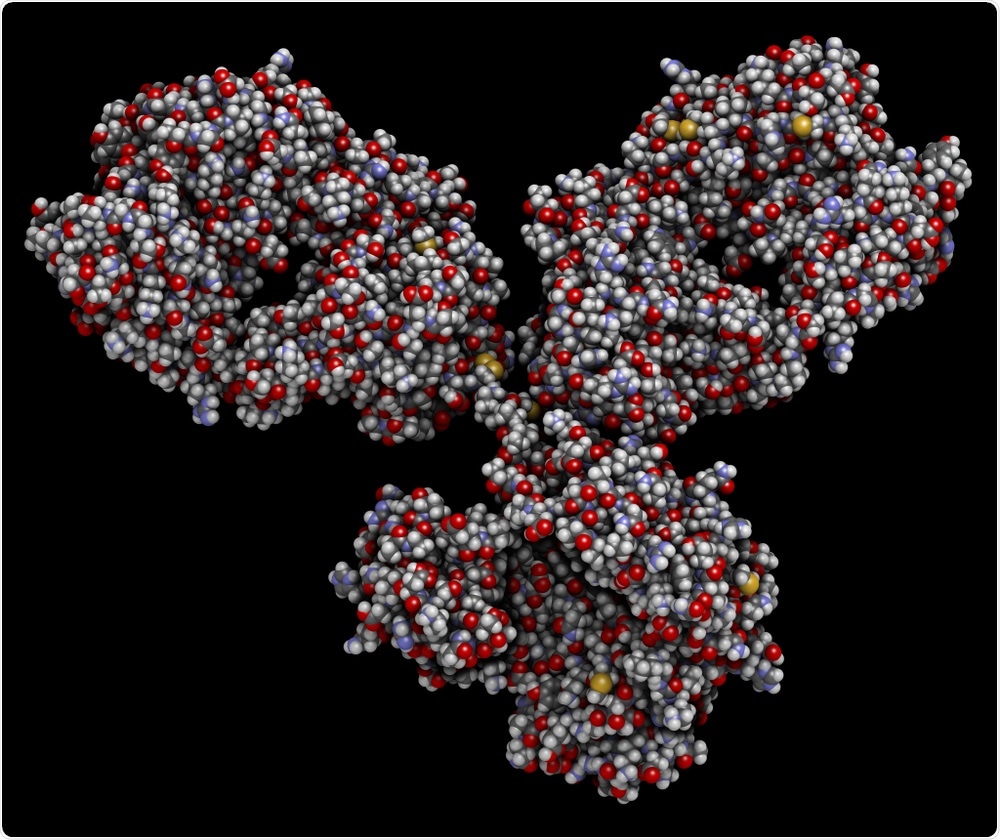For many years’ antibodies have been used in therapeutic applications to treat a plethora of diseases and ailments, from rheumatoid arthritis and psoriasis to various forms of cancer.

Image Credit: StudioMolekuul/Shutterstock.com
The characterization of new antibodies is therefore essential in the development of antibody leads to clinical candidates.
A recent study carried out by researchers at the Centre d’Immunologie Pierre‐Fabre and the Laboratoire de Spectrométrie de Masse BioOrganique in France explored the use of mass spectrometry methods in characterizing and optimizing antibodies.
In a paper published in the journal Structural Biology in Drug Discovery, the team describes how they are investigating the Hz6F4 antibody and its derivatives using a combination of in vitro, in sera, and in-cell and tumor tissue mass spectrometry methods.
Their conclusions will likely impact future antibody applications, which are becoming increasingly important in the medical field, particularly cancer research.
The use of antibodies in therapeutics to be enhanced by better characterization methods
Antibodies are extensively used in a wide range of applications in the healthcare sector. From pregnancy tests to diagnostic tools and therapeutic interventions for cancer, particularly breast and colorectal, and other illnesses and diseases, such as multiple sclerosis, rheumatoid arthritis, and psoriasis, antibodies have become a vital component.
The body’s immune system produces antibodies to recognize and destroy invading foreign antigens, and it is this function that has been exploited by the number of antibody applications in the medical field.
Currently, five classes of human antibodies have been determined by scientific research, these are IgGs, IgMs, IgAs, IgDs, and IgEs.
Each class of antibody can be classified by its structural and functional characteristics.
IgG1 is potentially the most commonly used therapeutic antibody in today’s market, and the use of IgG2s and IgG4s is increasing, producing products that have reduced antibody effector functions.
The major class of antibody-based drugs is known as recombinant monoclonal antibodies (MAbs) has been determined to be the fastest-growing class of human therapeutics.
A wide range of MAbs and their related products, including antibody-drug conjugates (ADCs), antibody mixtures, biosimilars, biobetters, radio‐immunoconjugates, bispecific antibodies, Fab fragments, Fc‐fusion proteins/ peptides, and immune cytokines, have been approved for use by the Food and Drug Administration (FDA).
The French team aimed to assess MS‐based analytical techniques that could characterize mAbs, to elucidate techniques, enhancing the characterization and development of new antibody leads into clinical candidates.
Exploring MS-based techniques
The team explored the use of MS‐based analytical techniques on three Hz6F4 isotypes, IgG1, IgG2, and IgG4. MS-based techniques have already become well established in the field of therapeutic mAb characterization.
Here, the team showed how these tools can analyze antibodies at different levels by investigating them with in vitro, in sera, and in-cell and tumor tissue methods.
Firstly, antibodies can be studied as intact molecules, providing rapid and reliable characterizations regarding the antibody’s homogeneity and purity by using intact and top-down MS.
Next, middle‐up or middle‐down MS approaches can be used to confirm the mass adequacy of the fragments obtained after enzymatic digestions and can also be used to locate posttranslational modifications at the level of the mAb subdomain.
Finally, bottom-up MS strategies can reveal the characteristics of peptide mixtures generated following enzymatic digestion.
Future directions
The team was able to establish how different emergent methods of mass spectrometry can be used to characterize antibodies.
This process has become increasingly important in the development of new therapeutic approaches, particularly for establishing enhanced methods of diagnosis and treatment of cancer. The development of next generation mAbs will likely rely on the early use of emerging MS methods to enable structure optimization of these new antibodies.
Journal references:
Boeuf, A., Debaene, F., Ayoub, D., Diemer, H., Ehkirch, A., Wagner‐Rousset, E., Van Dorsselaer, A., Cianférani, S. and Beck, A. (2020). Mass Spectrometry‐Based Strategies for Therapeutic Antibodies Extensive Characterization and Optimization (OptimAbs). Structural Biology in Drug Discovery, pp.503-519. https://onlinelibrary.wiley.com/doi/abs/10.1002/9781118681121.ch21
Leavy, O. (2010). Therapeutic antibodies: past, present, and future. Nature Reviews Immunology, 10(5), pp.297-297. https://www.ncbi.nlm.nih.gov/pubmed/20422787
Leavy, O. (2016). The birth of monoclonal antibodies. Nature Immunology, 17(S1), pp.S13-S13. https://www.nature.com/articles/ni.3608#citeas